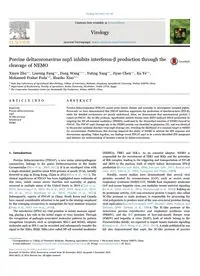
2017 Porcine deltacoronavirus nsp5 inhibits interferon-_ production through the cleavage of NEMO PDF
Preview 2017 Porcine deltacoronavirus nsp5 inhibits interferon-_ production through the cleavage of NEMO
Contents lists available at ScienceDirect Virology journal homepage: www.elsevier.com/locate/yviro Porcine deltacoronavirus nsp5 inhibits interferon-β production through the cleavage of NEMO Xinyu Zhua,c, Liurong Fanga,c, Dang Wanga,c,⁎, Yuting Yanga,c, Jiyao Chena,c, Xu Yea,c, Mohamed Frahat Fodaa,b, Shaobo Xiaoa,c,⁎ a State Key Laboratory of Agricultural Microbiology, College of Veterinary Medicine, Huazhong Agricultural University, Wuhan 430070, China b Department of Biochemistry, Faculty of Agriculture, Benha University, Moshtohor, Toukh 13736, Egypt c The Cooperative Innovation Center for Sustainable Pig Production, Wuhan 430070, China A R T I C L E I N F O Keywords: Porcine deltacoronavirus nsp5 3C-like protease Interferon-β NEMO A B S T R A C T Porcine deltacoronavirus (PDCoV) causes acute enteric disease and mortality in seronegative neonatal piglets. Previously we have demonstrated that PDCoV infection suppresses the production of interferon-beta (IFN-β), while the detailed mechanisms are poorly understood. Here, we demonstrate that nonstructural protein 5 (nsp5) of PDCoV, the 3C-like protease, significantly inhibits Sendai virus (SEV)-induced IFN-β production by targeting the NF-κB essential modulator (NEMO), confirmed by the diminished function of NEMO cleaved by PDCoV. The PDCoV nsp5 cleavage site in the NEMO protein was identified as glutamine 231, and was identical to the porcine epidemic diarrhea virus nsp5 cleavage site, revealing the likelihood of a common target in NEMO for coronaviruses. Furthermore, this cleavage impaired the ability of NEMO to activate the IFN response and downstream signaling. Taken together, our findings reveal PDCoV nsp5 to be a newly identified IFN antagonist and enhance the understanding of immune evasion by deltacoronaviruses. 1. Introduction Porcine deltacoronavirus (PDCoV), a new swine enteropathogenic coronavirus, belongs to the genus Deltacoronavirus in the family Coronaviridae (Woo et al., 2009, 2012). It is an enveloped virus with a single-stranded, positive-sense RNA genome of nearly 25 kb, initially detected in pigs in Hong Kong, China in 2012 (Woo et al., 2012). The clinical significance of PDCoV has been highlighted since outbreaks of this virus, which causes severe diarrhea and mortality of piglets, occurred in multiple states of the United States in 2014 (Chen et al., 2015; Homwong et al., 2016; Hu et al., 2015, 2016; Jung et al., 2015; Ma et al., 2015; Marthaler et al., 2014; Thachil et al., 2015). Subsequently, reports of PDCoV in China, South Korea and Canada have caused considerable attention to be paid to the strategy employed by this emerging coronavirus to manipulate the host immune response (Dong et al., 2015; Lee et al., 2016). The interferons (IFNs) are vital proteins in innate immune signal- ing, playing a key role in the initial stages of virus invasion. Through the recognition of pathogen-associated molecular patterns by pattern recognition receptors, such as cytoplasmic RIG-I and MDA5, adapter molecules such as IPS-1 can be recruited and subsequently transfer the signal to the IKKα, IKKβ, IKKγ (also called NF-κB essential modulator (NEMO)), TBK1 and IKK-ε. As an essential adapter, NEMO is responsible for the recruitment of TBK1 and IKKε and the activation of IKK complex, leading to the triggering and transportation of NF-κB and IRF3 to the nucleus, both of which induce downstream IFN-β production (Kawai and Akira, 2006; Loo and Gale, 2011; Ramos and Gale, 2011; Seth et al., 2005; Yoneyama and Fujita, 2009). Notably, recent studies have demonstrated that several viral proteins encoded by coronaviruses (CoV), such as severe acute respiratory syndrome (SARS) CoV, Middle East respiratory syndrome CoV and mouse hepatitis virus, can modulate innate antiviral signaling (Li et al., 2016; Lui et al., 2016; Thornbrough et al., 2016). Relying on its proteinase activity, CoV non-structural protein 5 (nsp5), also called 3C-like protease or main protease, is responsible for processing the viral polyprotein to produce most of the non-structural proteins during viral replication (Lai and Cavanagh, 1997; Masters, 2006; Perlman and Netland, 2009; Ziebuhr et al., 2000). The 3C-like protease of the Arterivirus porcine reproductive and respiratory syndrome virus (PRRSV), and the 3 C proteases of foot-and-mouth disease virus (FMDV) and hepatitis A virus (HAV), both of which belong to the Picornaviridae family, are reported to impair innate immune signaling (Huang et al., 2014; Wang et al., 2012, 2014). A study published by our lab also demonstrated that nsp5, the 3C-like protease of porcine http://dx.doi.org/10.1016/j.virol.2016.12.005 Received 18 October 2016; Received in revised form 30 November 2016; Accepted 3 December 2016 ⁎ Correspondence to: College of Veterinary Medicine, Huazhong Agricultural University, 1 Shi-zi-shan Street, Wuhan 430070, China. E-mail addresses:
